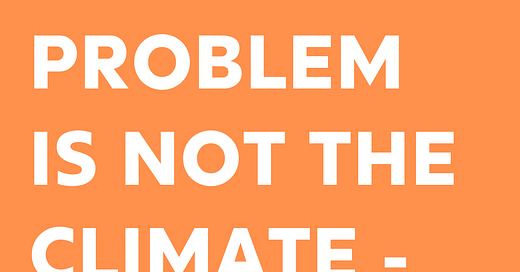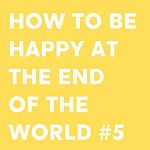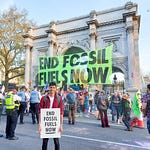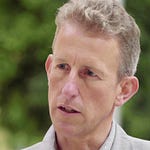Why won’t we solve the climate crisis?
Because the climate is not the problem - we are.
Our worldview, the way we interpret the world and each other, what Herman Daly calls our ‘pre-analytic vision’, or what other’s refer to as our paradigm or our culture -that’s the problem.
Our current crises serve to show us that our whole way of understanding our shared reality is faulty. This understanding is foundational to our entire civilisation and has been for thousands of years. Which is what makes the current predicament so monumental and why plastic straws just aren’t going to cut it.
This shared understanding has gifted us immense wealth and prosperity and has freed so many from so much suffering but it’s based on an understanding of the world and ourselves as separate.
We are not separate from each other or from nature - we are nature.
Yet we see ourselves as somehow distinct and detached, isolated and alienated from the world around us; somehow we’ve become discrete actors on a stage with everything else serving only as a painted, fixed backdrop.
It’s a lie. An unconscious one but a lie all the same.
We are completely entangled in countless systems. Not only is everything we do entangled in such systems but so too is everything we think as well, because living in these webs means that everything is constantly being determined in relationship to everything else.
Everything we think and do is co-created in a giant dance that seems messy and chaotic but is playing out in nested systems where the distinction between parts and wholes is no longer as useful as principles, functions and relationships, all co-evolving in one giant self-regulating system that is the earth, itself a part of larger systems all the way up to the universe.
The problem isn’t the climate, it’s us. It’s our inner world, our stories, our ways of seeing and making sense of the world. We are seeing the world askew, through distortions and misperceptions and we can’t address our climate and ecological crises until we transform the way we see the world and ourselves.
We are not separate from the world. The universe is not a cold, dead place. Your consciousness itself is evidence that the universe is conscious because it is not separate from you - you are it, it is you.
The climate isn’t the problem, it’s that we’ve somehow lost our souls, our roots and our connection to the world and all life on it.
How else could we cut down the Amazon, burn fossil fuels, and kill each other?
It is a problem of our minds and their perspectives and a problem of our hearts and their disconnection.
Both have been programmed by our stories. Stories of scarcity, hostility and separation. Stories of machines, of parts, of false competition and duality of mind and body, of us and them - stories of the ‘other’ when there is only one.
Stories of how we were made and put here. Of nature as a cold, harsh beast and of the human as even colder and far harsher when left to express our true nature.
Stories that no longer serve us.
Separation drives a wedge of division between us and all things like a stake through the heart. What we do to the world, to each other and all living things, we do to ourselves. It is only our worldview that tells us otherwise, a story that enables mass destruction. A story that is nothing more than an illusion, a misperception and a distortion. It is a story that confers great power to the teller, which is why it continues to be told - we’ve built our entire civilisation on it after all.
But it is just a story.
Our solution doesn’t lie in carbon capture and storage technologies that don’t yet exist, or anything for that matter in the external world. It lies in the changing of our minds and in the reconnection between ourselves and all life that flows as a result.
It lies in the wiping of our eyes to remove the distortions and misperceptions that keep us from seeing the world as it truly is: infinite and full of love, all the way through.
Such a transformation is inevitable, it is the lesson of the climate crisis.
The question is simply one of: how long will it take us to learn it as a culture? How long will it take to assimilate what our sciences are telling us, into the stories of who we are and how all this came to be? How long will it take us to realise just how miraculous, wonderful and entangled we all are? When will our stories become one?
This lesson will cost us dearly to learn. Just how much it ends up costing us is up to us and our appetite for change. I’m often told by my coaching friends that people only change once it becomes more painful to stay the same than to transform (aka hit rock bottom), a rock bottom that is either achieved or imagined, depending on the individual’s beliefs and values.
So what will it be for this civilisation? Will we transform overnight following a great realisation? Or over many decades as we find rock bottom? This is for us all to decide.
The fact that we’ve been born at a time where such a choice is possible is unbelievably rare, perhaps even unique and the consequence of this choice has implications not only for all life on earth but on the nature of human consciousness too. It is a call to a level of self-awareness we’ve never experienced before, an awareness of our oneness, of our entanglement in all things, of a different way of seeing ourselves and all life.
This choice is yours, it’s all of ours and we shouldn’t be scared to make it. It’s easy and there are no wrong answers, whatever we choose to do. Why? Because we are not separate from it, everything we do we are doing to ourselves, this is Karma.
Even at times of great crisis and chaos, upheaval and change, everything is always absolutely perfect as it is because it is you.
So in making your choice of the story you want to tell of the world you are in and how you want to respond to it, you define yourself because you and it are not separate.
Which equally means that in defining yourself, you define the world and every entanglement you have with it.
If we want to change the world, we need only change our selves by changing our stories. The stories that define us, that shape our beliefs and our identities because it is these stories that programme the way we see the world and how we see the world determines how we interpret it and how we act.
The climate isn’t the problem that needs solving, it’s us.














Share this post